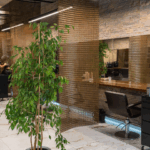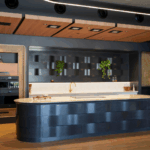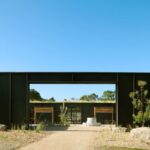Ajitama Ramen Bistro
Ajitama Ramen Bistro in Portugal is a restaurant born out of the dream and ambition of two friends in love with the traditional Japanese dish of ajitama.
After they journeyed to Japan, a long friendship was reinforced by this passion and search for the most authentic ramen in Lisbon.

GALLERY
Unlike other European countries, ramen in Portugal was an unknown concept until a few years ago. The two friends weren’t satisfied with the existing ramen on offer and decided to venture into their own project together.
Ajitama (味たま) is the Japanese name for soft-boiled eggs that have been marinated for several hours in a homemade broth, which constitutes the iconic ramen flavour, and is the ultimate Japanese comfort food. This dish consists of a perfect combination of fresh noodles in a complex broth and a series of different toppings with umami. It is finished with the ajitama, which makes it a sublime delicacy.
The space where the new restaurant has opened is part of a fully refurbished building, in a block dated from the beginning of the 20th Century. Its location is marked by an axis of great affluence, between offices and wide avenues, occupying a prominent position in a beautiful corner.
JCFS Architects was challenged to develop the restaurant project. The ajitama constituted itself as the core of all the ideas for the construction of the space, inspired by its meaning for the two friends.
From this moment on, it was necessary to conceive a space that would transport visitors to a Japanese environment. In this way, JCFS resorted to a material that brings people to oriental surroundings. The trellises are used to construct this symbol that represents the determination, precision and organisation of the Japanese people. The huge illuminated installations suspended from the ceiling defines the space, framed by the planes of the floor and the walls in a very simple shape.
The repetition and interpretation of the egg concept is projected in these installations, counter and toilets. The result is a mixture of sensations in which the Neons of the façade transport visitors to the crazy streets of Tokyo, the suspended wood, sculpted in the shape of eggs confers a lightness to the space, giving the feeling of having no end and in which the sky has no limit. The counter evokes the Japanese meal in its natural habitat in which the chef can be seen cooking this beautiful delicacy.
Playing with the duality between raw, tradition and elegance, Eastern tradition and Western representation, JCFS introduces a cross between a restaurant that is intended to be fast, efficient, practical and upscale, comfortable and memorable.
Via ArchDaily | Images © Fernando Guerra
RE/8™ Bio-circular Architectural Mesh by Kaynemaile offers exceptional versatility. Perfect for adding a touch of privacy, it makes ...
Great news for homeowners planning a reno in Queensland: Austaron’s exquisite new showroom in Brendale is now officially ...
The Regenerative Futures Studio has been conceived as a carbon sequestering, solar powered living ecosystem that reframes how ...
A vacant eight storey office building in Richmond’s Swan Street precinct could be transformed into a 148 room ...













